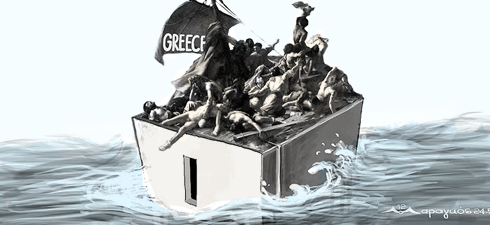We are approaching the end of an unbearable process, as the pre-election period has laid bare a political primitivism of unprecedented proportions. It catapulted Syriza chief Alexis Tsipras from the fringes to the centre of the Greek political stage. The previous elections [on May 6] resulted in a parliament of extremes. We have reached a dead end.
Fear of the unknown, the dangers of major upheavals that may prove fatal, and the spectre of a Greek exit from the eurozone have resulted in galvanizing New Democracy (ND, right), at least to a point, which may lead to its being able to significantly increase its percentage in these elections compared to May 6. [Ex-Athens mayor and ex-Foreign minister] Dora Bakoyannis's decision to return to ND's ranks certainly paid off as it helped bring back liberal voters to the broad centre-right fold, though the fragmentation of a part of the traditional rightists from ND remains.
ND leader Antonis Samaras will most likely win next Sunday's elections. His first order of business will be to reverse the catastrophic policies of the last two Pasok administrations, which handled the crisis with lamentable amateurism and with the troika cobbled together two memorandums that have been widely acknowledged as being lacking at best.
The political parties that want Greece to stay in the eurozone are pinning their hopes on German Chancellor Angela Merkel changing her stance toward Athens, under pressure from the countries of southern Europe, French President François Hollande and US President Barack Obama, who is scrambling for re-election on the first Tuesday of November.
A head-on collision
Without getting into the moral aspect of the matter, Germany is effectively being asked to shoulder the burden of the eurozone's failure because it has benefited from the monetary union over the past few years, though thanks to its own sage policy. A radical change in the stance of the German government would ultimately mean Merkel committing political suicide in order to save the eurozone's indebted states.
It is not at all certain that Merkel will sacrifice herself, but until November she will show some signs of softening - on the condition of strict fiscal discipline - simply in order to avert a head-on collision with Obama. This will be the most crucial period for Greece. A lot will go down to the wire in the next few months, and it is clear that a unity government headed by ND and consisting of pro-Europe parties would be the most favorable.
In the present circumstances, a head-on collision with the European Union led by the belief that "pressure from the masses" will compel the bloc's mightiest to change their position is rash and irrational.
Was this article useful? If so we are delighted!
It is freely available because we believe that the right to free and independent information is essential for democracy. But this right is not guaranteed forever, and independence comes at a cost. We need your support in order to continue publishing independent, multilingual news for all Europeans.
Discover our subscription offers and their exclusive benefits and become a member of our community now!












